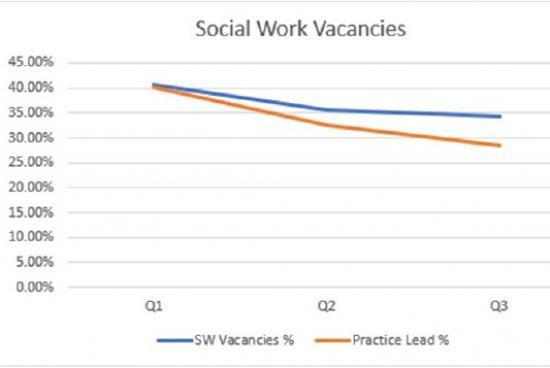Chief Social Work Officer Annual Report Highlights Severe Shortage Of Social Workers
14th September 2024

The annual report by the Chief Social Work Officer will be discussed by Highland councillors on Thursday 19 September 2024.
Part of the report highlights the issues surrounding the high level of vacancies in Social Work in Highland region. Recruitment difficulties are being felt for the past few years across all levels of care.
The report highlights the delivery of services across all social work services (children's, justice, and adult social work services and social care). It provides an overview of the professional activity across Highland via the delivery of statutory functions and responsibilities held by the Chief Social Work Officer.
From The Report
Workforce Vacancies
Workforce vacancies are a major challenge for all services across Highland. However, the most acute vacancies are being experienced in Children's Social Work. The following graph - whilst demonstrating progress being made - needs to be taken in context. Quite simply, vacancy levels remain so high, they are articulated as a key risk on the Corporate Risk Register.
Whilst we have been able to recruit workers, many are newly qualified. This brings additional pressure around supervision requirements. Further, newly qualified staff cannot take on complex cases so capacity within teams is reduced even though staff numbers have increased.
The vacancy rate for social workers in Justice is 19%. Historically, Justice Services have a stable and full workforce. However, they are also seeing vacancies emerge alongside a reducing pool of social workers to recruit from.
Within the MHO Team, the increasing volume of work (particularly in relation to Adults With Incapacity) has led to demand often exceeding service capacity. Due to an aging population, this is expected to continue on an upward trajectory. It is acknowledged that this is a national issue not just a Highland one.
Front line team managers are responsible for ensuring workload prioritisation and allocation of work across locality teams. Our managers are carefully screening and prioritising requests for assistance, where there are concerns, predominantly from partner agencies in Police, Health and Education into our Family Teams. All protection work remains our highest priority.
Due to capacity issues, we have to prioritise according to risk. Consequently, other parts of service delivery may receive a reduced focus (eg. early help from services in Family Teams or focus on permanency work). To compensate, universal services in Child Health and Education are now having to deal with increasing complexity of need.
Care at home and care homes are experiencing significant recruitment challenges. NHSH is well aware of its own staffing challenges, and these are being similarly, and arguably, more acutely, experienced by independent sector providers, whose terms and conditions are generally lower than those offered by NHSH.
In Highland, the unemployment rate is 2.7%, which is significantly lower than the Scottish average of 3.2%.
This means there is a comparatively lower pool of potential employees within the marketplace in Highland from which to recruit. Within Highland, there are further particularly challenged areas around tourism and seasonal economies, increasing the level of difficulty recruiting and retaining staff.
Read the full Chief Officers Social Work Report HERE
